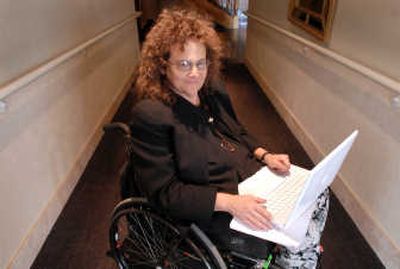I-1000 advocates raking it in

OLYMPIA – If there’s any doubt that Washington’s about to be a national battleground in the fight over assisted suicide, just take a look at the checks.
With months to go before Election Day, Washington’s Initiative 1000 has drawn contributions from all 50 states, Washington, D.C., and Puerto Rico. Among them: more than 400 contributions from California, nearly 150 from New York and $215,000 from the Oregon group Death With Dignity.
“There is a passionate interest in government restrictions and government intrusion into end-of-life choices,” said Barbara Coombs Lee, president of the Portland-based group Compassion and Choices. The group’s Idaho chapter, based in Coeur d’Alene, donated $1,000.
The initiative would make Washington the second state to allow physicians to prescribe a lethal dose of medication for mentally competent terminally ill patients who request it. Proponents say dying people should be able to choose the terms of their exit from life. Opponents say the safeguards are grossly inadequate, and it’s a slippery slope from I-1000 to euthanasia.
Oregon has had such a law for a decade, and other states have considered it. Washington, both sides say, is the only state considering such a measure this year.
As of the last reporting period April 10, proponents had collected nearly $900,000, and spent nearly $600,000, much of it on political consultants, fundraising and signature-gatherers. It takes about 225,000 signatures to get an initiative on the November ballot. The signature-gathering is going better than expected, said Yes on I-1000 spokesman Christian Sinderman. And both sides are bringing in speakers to frame what’s certain to be an emotional public debate, as it has been elsewhere.
“They didn’t get California, couldn’t get Vermont, and they’re trying to get Washington,” said Marilyn Golden, a California-based disability rights advocate who was in Eastern Washington last week arguing against the measure.
Why Washington? This is, after all, a state that rejected a similar initiative in 1991.
Part of the reason, proponents say, is the presence of a strong, well-liked frontman for the campaign: former Gov. Booth Gardner. Gardner, battling Parkinson’s disease, filed the measure in January. He said the battle to legalize death with dignity, as his side frames it, will be his last campaign.
“In the midst of agony, there is potential for peace,” Gardner wrote in a recent four-page fundraising letter.
The law in most of America prohibits a dying person from choosing the time to die. “The time has arrived to change that inhuman reality,” Gardner wrote. “Voters in my home state of Washington can pass a sensible, rational ‘Death With Dignity’ law this November.”
Also, Sinderman said, Washington is close to Oregon, which has a long track record with such a law.
“And Washington’s electorate is different,” he said. “We’re a state that values people’s privacy and civil liberties.”
Opponents, including Catholics and advocates for the disabled, are gearing up for a long battle. So far, they’ve raised about $50,000.
“It just feels so stacked against us,” said Duane French, a quadriplegic who helped form the coalition fighting the measure.
“Proponents have carefully been plotting and planning for several years,” said Spokane’s Chris Carlson, steering committee president for the Washington Coalition Against Assisted Suicide. “They think this is the most logical state because it’s the most secular, least church-going state in the nation.”
In recent years, 26 states have considered legalizing assisted suicide, he said, “and 25 of the 26 have rejected it.”
Both sides have done polling in Washington. Gardner’s fundraising letter said proponents’ polling indicates 64 percent support for a Death With Dignity law.
Carlson said his group’s polling suggests that less than 60 percent support it. A strong “no” campaign, he says, could easily raise enough questions in the minds of voters to sink the measure.
Both sides agree that I-1000 is a David-and-Goliath struggle. But both claim to be the underdog.
But proponents say that in state after state, money has quickly flooded in from politically powerful groups: doctors, the Catholic Church and right-to-life groups.
“Those people say jump and the political electeds say, ‘How high?’ ” said Lee, with Compassion and Choices. “They have no reason to tip their hand now, but the money will pour – pour – in to opposition.”
Gardner made a similar suggestion in his letter: “Our campaign budget is roughly $1.0 million and we will need every penny. We fully expect to be outspent by the extreme elements that oppose us.”
Carlson said opponents are hoping for “an uptick” in fundraising, but he knows of no wave of cash on the horizon.
Proponents “like to create a myth that there’s some sugar daddy that’s going to come rolling in at the last minute,” he said. “I’m dubious of that.”